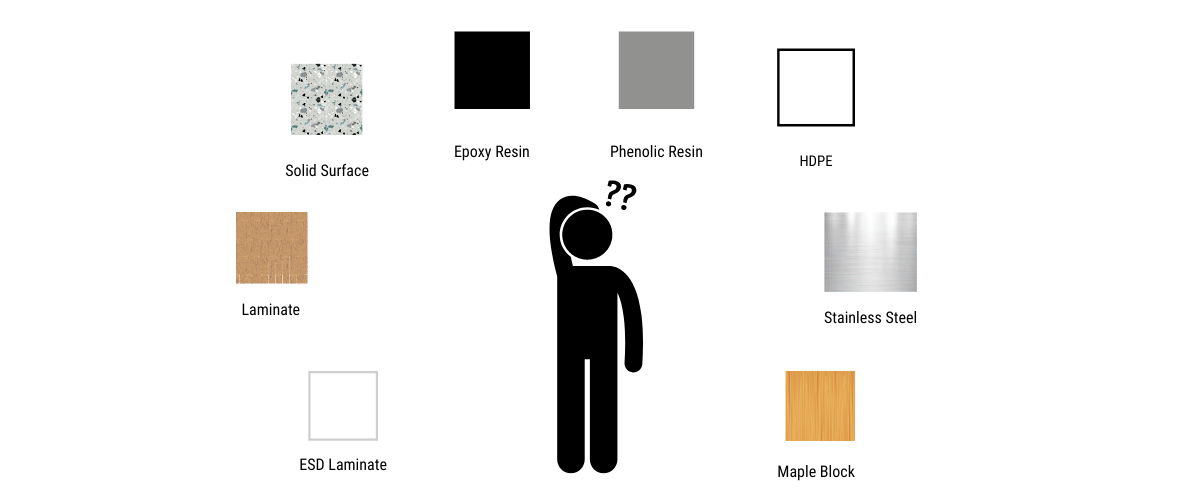
Different types of labs require different work surface materials for laboratory workbenches. The 7 most commonly used countertop materials for scientific or industrial use are epoxy resin, phenolic resin, stainless steel, maple block (aka butcher block or wood block), solid surface, HDPE, and ESD laminate.
Due to the use of caustic reagents and complex instrumentation, choosing the right surface material for your laboratory workbenches is a crucial decision when outfitting a lab with furniture. The main factors that go into the decision-making process are:
- acid resistance
- microbial resistance
- scratch resistance
- ease of fabrication in the field
- hygiene, aesthetics
- static resistance
- stain resistance
View more lab bench resources:
Choosing appropriate surfaces based on the needs of researchers is the key to a successful laboratory workbench project.
Epoxy Resin Lab Countertops
Epoxy resin is the most commonly used work surface material for scientific and laboratory applications. This is widely used in biology, chemistry, pathology, and immunology labs, as well as elementary, middle school, high school, and college and university labs.
Strengths of Epoxy Resin Bench Tops
Epoxy resin is sturdy, durable, and chemical resistant to most common laboratory reagents. It is easy to clean and is most commonly supplied in a sleek black finish.
Weaknesses of Epoxy Resin Bench Tops
Unlike its counterpart phenolic resin, epoxy resin table tops are easily scratched and marred. This is particularly problematic in school settings where graffiti is common and can pose problems if moving heavy equipment or metal instrumentation on the surface, such as bunsen burners.
Epoxy also is difficult to fabricate in the field. If during an install there needs to be an alteration to a countertop, cutting and smoothing the top can present extremely chalky residue to emit into the air.
Don’t let that scare you off though. Epoxy is an excellent material for laboratory workbenches.
There are only a few manufacturers of epoxy resin in the US. We partner directly with Durcon to get preferred pricing and lead times, making us a go-to source for millwork, carpentry, and cabinet shops seeking a countertop supplier for their products.
Phenolic Resin Countertops
Solid phenolic resin countertops, aka Solid Phenolic Compact and similar to the commonly known Trespa material, is a high-pressure solid composite manufactured by Durcon (part of WilsonArt). It is created by drenching many layers of kraft paper with phenolic resin and then placing the slab under a thermosetting process in a high-temperature oven.
Phenolic resin lab countertops are specially made for laboratory
and scientific uses. However, the material is very versatile and can always be fabricated into tables, toilet partitions, wall panels, fume hood decks and
liner panels, drying racks, reagent shelfving, commercial surfaces, drawer fronts, casework, and much more.
Strength of Phenolic Resin Lab Work Surfaces
Phenolic resin has a very high degree of chemical resistance and cuts well in the fields when alterations need to be made. Due to its
laminated material, it is extremely scratch resistant.
Phenolic resin is arguably the best material one can use for lab workbenches that need a high degree of resistance. If dealing with highly caustic reagents such as phosphoric acid or sulphuric acid, phenolic is an excellent choice.
Another major benefit of phenolic resin is its low cost and ease of procurement. It is overall easier to get a hold of than epoxy, and is often more budget-friendly as well.
Overall phenolic is an excellent do-it-all material with
little to no downside. We recommend phenolic resin in as instances when it is an available option.
Stainless Steel Tables
The third category of work surface material to consider using for your laboratory is stainless steel. Stainless steel cleanroom tables are great for any type of lab, but they are especially well suited for clean rooms.
Cleanrooms, in case you are unfamiliar, are specially built
lab environments with highly efficient HVAC systems that are designed to maintain
extremely low levels of particulates. Cleanroom tables, benches, and carts are
required to house and transport everything from pharmaceutical items, sensitive
biological materials and contaminants, and dangerous chemicals.
Stainless steel is the preferred material of choice for
cleanrooms as it has the best hygienic and anti-microbial properties while
being very heavy-duty and long-lasting. However, stainless steel is valuable in areas well outside of specialized labs.
Countertops in restaurants kitchens like Starbucks, veterinarians,
taxidermy, funeral homes and morgues, and other sanitation-focused environments are ideal facilities for stainless steel tables. While there is no clear downside to stainless steel, it is typically more suitable for larger budgets.
Outside of the big three for laboratory workbenches (epoxy, phenolic, and stainless steel), there are a few other specialty materials that can be found in the sciences and industry.
Maple Wood Block
Maple block countertops, also known as woodblock or butcher block, are a sturdy and long-lasting material. Over time woodblock tables will succumb to scratches and burns but will last for more than enough time to get your money’s worth.
We see this material most often in work surfaces for workshops. Whether it is a 3-D printing room, a robotics lab, a manufacturing plant, distribution
center, or warehouse, workbenches for industrial applications are a great fit for maple blocks.
High-Density Polyethylene Sheets
HDPE sheets are a great low-cost option for environments that take a beating, like a kitchen or deli countertops. These are great in both commercial applications and scientific/industrial alike.
While HDPE isn’t ideal for laboratory workbenches that have especially demanding chemical requirements, that is still a good option for certain applications. It is a sturdy material that shouldn’t be overlooked.
ESD Workbench
ESD workbench areas are a must-have for organizations dealing with electronics. Whether you need to outfit a fulfillment center shipping devices, or are conducting research on semiconductors and circuitry, ESD tables are a likely first and only option.
We supply ESD workbenches on a variety of different frame configurations with fully custom shelving and accessory options.
Wilsonart Solid Surface
Solid surface countertops are flexible and cost-effective products that have hygienic properties perfect for medical, doctor, and dental offices and labs. Manufactured by Wilsonart, solid surface countertops are an acrylic based product similar to Corian, quartz, and Formica in look but unique in physical properties.
Need Help Choosing Your Perfect Material?
The lab bench experts of OnePointe Solutions have built hundreds of scientific, industrial, and commercial facilities and are happy to help guide you to the right choice for your needs. Build your perfect laboratory workbench today.
To get a 100% free, no-obligation consultation, contact us at (866) 612-7312, or by filling out a website form or chatting with us on our website.


